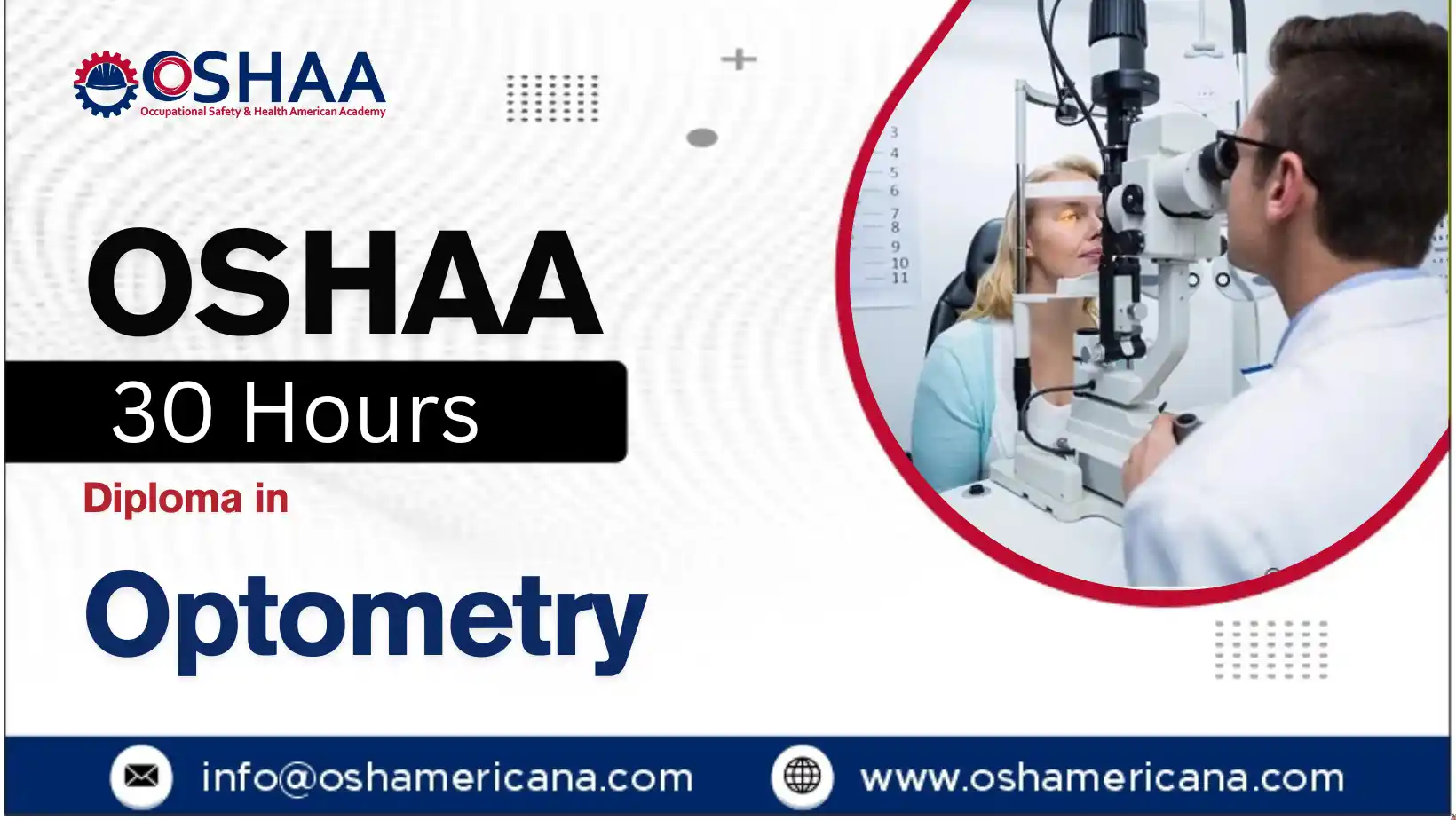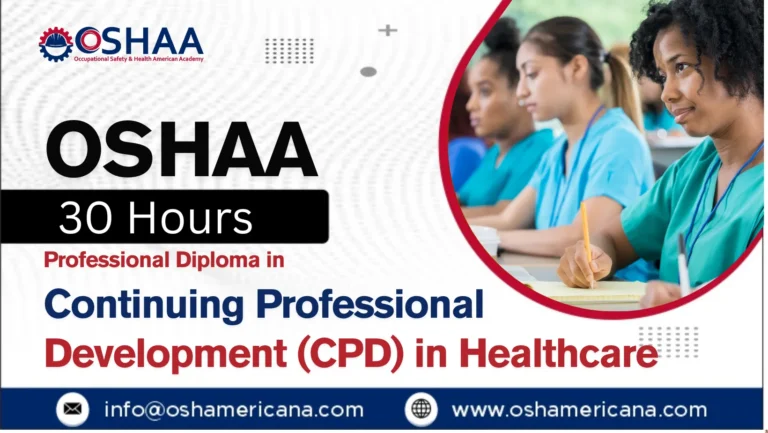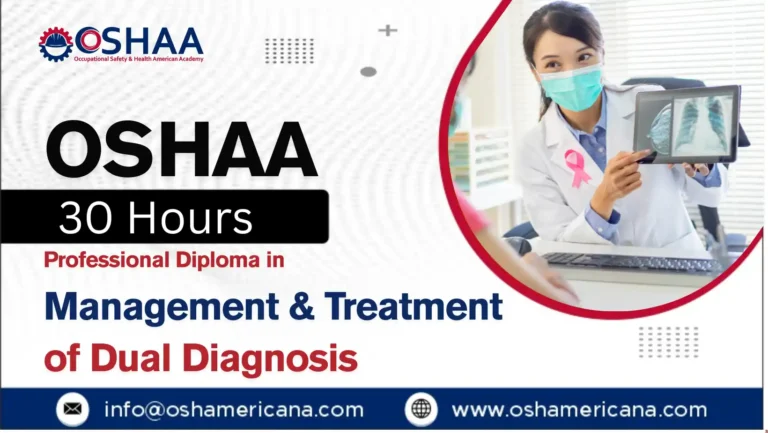Optometry plays a crucial role in maintaining and improving vision health, with optometrists serving as primary healthcare professionals responsible for assessing, diagnosing, and treating various visual disorders. As demand for eye care services grows, so does the need for qualified professionals who can provide high-quality care to patients. The OSHAA 30-Hours Diploma in Optometry is a comprehensive, flexible course designed to help individuals working in eye care, including optometrists and healthcare professionals, enhance their knowledge and skills in the field of optometry.
The OSHAA 30-Hours Diploma in Optometry offers an in-depth understanding of the principles of eye care, with a focus on the most essential aspects of optometry. The course is designed to accommodate busy professionals who want to advance their expertise and stay current with the latest advancements in the field.
Completing the OSHAA 30-Hours Diploma in Optometry equips you with the necessary skills to advance in the optometry field. Whether you are seeking to enhance your practice or specialize in specific areas of optometry, this diploma provides the foundation you need to excel. As the demand for optometry services continues to rise, the ability to provide high-quality care and stay informed about new treatments and technologies will be highly beneficial in your career.
The OSHAA 30-Hours Diploma in Optometry is a key qualification for anyone looking to deepen their understanding of eye health and optometric practices. Whether you are a practicing optometrist or an aspiring eye care professional, this diploma offers the knowledge and skills to enhance your clinical expertise, improve patient care, and advance your career in the field of optometry.
OSHAA 30-Hours Diploma in Optometry
Study Units
Learning Outcomes
Introduction to Eye Anatomy and Physiology (3 hours)
- Understand the structure and function of the eye, including the cornea, lens, retina, and optic nerve.
- Gain knowledge of how light is processed and transmitted to the brain for visual perception.
- Recognise the roles of different parts of the eye in the visual process and their relevance to optometric practice.
Common Visual Disorders and Their Diagnosis (4 hours)
- Identify and diagnose common visual disorders such as myopia, hyperopia, astigmatism, and presbyopia.
- Understand the causes, symptoms, and diagnostic methods for these conditions.
- Learn to recognise the signs of visual impairment and implement appropriate diagnostic procedures.
Optometric Eye Examinations and Techniques (4 hours)
- Master various techniques for performing comprehensive eye exams, including visual acuity testing and slit-lamp examination.
- Learn how to assess the health of the eye and its components using optometric tools.
- Understand the procedure for conducting a thorough eye exam and interpreting the results for accurate diagnosis.
Refraction and Visual Acuity Testing (3 hours)
- Gain expertise in performing refraction tests to determine the correct prescription for glasses or contact lenses.
- Learn to measure visual acuity and interpret the results to identify the degree of vision impairment.
- Understand the importance of accurate refraction and how to adjust prescriptions based on individual patient needs.
Diagnosis and Management of Eye Diseases (4 hours)
- Identify common eye diseases such as glaucoma, cataracts, and macular degeneration, along with their symptoms and diagnostic criteria.
- Learn how to manage and monitor these conditions through appropriate treatment options and referrals to specialists when necessary.
- Understand the role of optometry in the early detection and management of eye diseases.
Optical Dispensing and Prescription Lenses (4 hours)
- Understand the process of dispensing optical prescriptions, including selecting frames, lenses, and coatings that suit the patient’s needs.
- Gain knowledge of different types of lenses and their suitability for various vision conditions.
- Learn how to educate patients on lens care, proper fitting, and maintenance of eyewear.
Contact Lenses: Fitting and Care (5 hours)
- Master the fitting process for contact lenses, including the selection of the right type based on patient needs.
- Understand the care, maintenance, and hygiene requirements for contact lenses to ensure patient safety and comfort.
- Learn how to troubleshoot common issues associated with contact lenses, such as dryness or discomfort.
Diagnostic Equipment in Optometry (3 hours)
- Gain familiarity with key diagnostic equipment used in optometry, including autorefractors, slit lamps, and fundus cameras.
- Learn how to properly operate and interpret the results from various diagnostic tools.
- Understand the role of these tools in diagnosing eye conditions and guiding treatment decisions.
- Enhanced Knowledge of Eye Health: Gain a comprehensive understanding of eye anatomy, common visual disorders, and diagnostic techniques, equipping you with essential knowledge to better assess and care for patients.
- Improved Clinical Skills: Master key optometric techniques, such as performing eye exams, refraction, and visual acuity testing, which are critical to providing accurate diagnoses and personalised treatment plans for patients.
- Expertise in Eye Disease Management: Learn to identify, manage, and monitor a wide range of eye diseases, ensuring you can provide optimal care to patients with conditions like glaucoma, cataracts, and macular degeneration.
- Practical Training in Optical Dispensing: Understand how to dispense prescription lenses and eyewear, including selecting appropriate frames and lenses, ensuring patient satisfaction with their eyewear choices and proper fitting.
- In-Depth Contact Lens Knowledge: Become proficient in fitting, caring for, and troubleshooting contact lenses, ensuring that patients receive the best possible care and advice for their contact lens needs.
- Hands-On Experience with Diagnostic Equipment: Gain proficiency in using modern diagnostic tools such as slit lamps, autorefractors, and fundus cameras, ensuring accurate and effective eye assessments in clinical settings.
- Patient Education and Communication: Learn how to educate patients about eye health, visual disorders, and proper eye care techniques, empowering them to make informed decisions about their vision and treatment.
- Career Advancement Opportunities: This diploma enhances your qualifications, making you more competitive in the optometry field and opening up opportunities for career progression, whether in clinical settings, private practices, or public health initiatives.
- Up-to-Date Knowledge and Skills: Stay current with the latest advancements in optometry, including new diagnostic techniques, treatments, and technologies, ensuring your practice remains relevant and effective.
- Flexibility for Working Professionals: The 30-hour structure allows you to balance your studies with your professional responsibilities, making it accessible to both current optometrists and healthcare professionals seeking to expand their expertise.
The OSHAA 30-Hours Diploma in Optometry is designed for healthcare professionals looking to expand their knowledge and expertise in the field of optometry. This course is ideal for:
- Practising Optometrists: Optometrists who wish to enhance their clinical skills, stay up-to-date with the latest advancements, and refine their practice in areas such as refraction, diagnosis, and treatment of eye diseases.
- Optometry Assistants: Individuals working as optometry assistants who want to develop a deeper understanding of optometric procedures, diagnostic equipment, and patient care techniques to advance their careers.
- Healthcare Professionals in Eye Care: Ophthalmic nurses, healthcare assistants, and other eye care professionals looking to specialise in optometry or broaden their knowledge of visual health and eye disorders.
- Optometry Students: Students currently pursuing a career in optometry who want to gain additional practical knowledge, enhance their training, and prepare for future roles in optometric practice.
- Optical Dispensers: Optical dispensers who wish to improve their understanding of optometry, including prescription lenses, eye diseases, and patient care, to better assist patients in choosing the right eyewear.
- Public Health Professionals: Healthcare workers focusing on public health who want to increase their ability to educate communities on eye care, early detection, and preventive measures for visual impairments.
- New Graduates Seeking Optometry Careers: Individuals who have recently completed their education in a healthcare-related field and are looking to specialise in optometry or expand their career prospects in the eye care sector.
- Professionals Interested in Eye Health: Anyone working in or interested in the field of eye health, including those in related areas such as ophthalmology or rehabilitation, who want to deepen their understanding of optometric practices.
This course is suitable for anyone passionate about eye health and looking to enhance their qualifications, whether you’re already working in optometry or aiming to enter the field. It provides the knowledge and skills necessary to advance your career in eye care and patient management.







